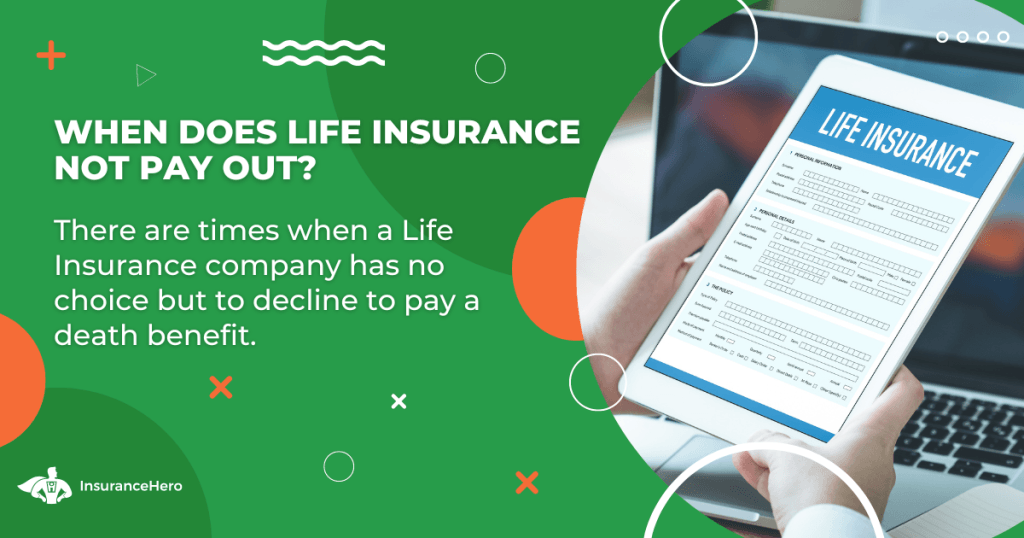Common Reasons Life Insurance Does Not Pay Out

People buy life insurance policies to ensure their family’s well-being once the person isn’t around to provide. For others, it’s a well-being plan rather than a safeguarding policy.
However, there could be various reasons why life insurance won’t pay out. Life insurance is one of those investments that, when done right with careful planning, can change the fortunes of entire families and future generations.
Misunderstand the policy exemptions; nobody will see a penny of what you thought was a wise investment.
According to the ABI report, the UK is the leader in the insurance industry in Europe, and 97% of life insurance claims are accepted and paid successfully.
However, for any policy, there will be exceptions to the rules on when it pays. Knowing these exceptions will financially protect you and your family when you are not around.
Does A Life Insurance Claim Always Pay Out?
The Association of British Insurers pointed out in their report that in 2021:
- 98% of protection claims were paid out.
- 97% of term life insurance claims were paid out.
- 92% of critical illness claims were paid out.
The high acceptance rate of life insurance claims is very reassuring. However, a few percentages remain, indicating that life insurance payments were rejected at some point. You should know the circumstances under which it happened so you can avoid it yourself.
Life Insurance Policies Exemptions
We should probably point out that these aren’t in place to diddle the customers out of what would otherwise be rightfully theirs. These exclusions apply to life insurance policies and critical illness cover to prevent fraud.
Compare Quotes From The UK’s Top Providers, Completely Free Quote Service, Save Money Now


Three Reasons Life Insurance Won’t Pay Out
1. You Outlive the Policy
One of the main reasons life insurance will not pay out is that the insured outlives the policy. This applies to term life insurance policies. Anyone with a fixed-term policy needs to ensure they consistently have coverage.
Taking out a 20-year term life insurance policy at the age of forty would only be valid if you die before you reach your 60th birthday. That’s probably not a wise investment.
After your term policy expires, you must renew it under your new conditions. Age 60, plus whatever medical conditions you’ve developed, must be disclosed. The only thing you can count on is that premiums will be higher. That is, if you use a like-for-like product by renewing your term life insurance.
When a term life insurance policy expires, a more suitable option is the over-50s cover. This life insurance cover doesn’t require any medicals and is ideal for people up to the age of 75.
You can always choose not to renew, but you’d forfeit the previous payments on the policy above. For that reason, you should consider the fixed-term period of a life insurance policy carefully before you sign, because outliving it is a bit like throwing it away.
2. Suicide
This one may surprise you. It’s not unusual to find it excluded, but some life insurance providers only apply this clause to the first 12 months of the policy.
Every company has safeguards against this type of claim for apparent reasons. Take the case of David Carr – a City Executive from London – who meticulously planned and waited until the first-year suicide clause had passed before taking a shotgun to his head.
Another thing about the suicide clause is even if the stated period has passed if a tragic suicide were to happen to a policyholder, it’s likely to have some crossover into the following reason after the 12-month exclusion.
For this very reason, life insurance companies may be reluctant to provide a life insurance policy to a client who struggles with mental health problems. Life insurance coverage is likely void if you neglect to mention suicidal thoughts.
If a policyholder takes their own life, an insurance company will not pay out. Most life insurance policies have this safeguard in place against people willing to commit suicide to ensure financial stability for their families.
3. Non-disclosure
One of the most common reasons life insurance won’t pay out is failure to disclose information. Otherwise, this is called dishonesty, and depending on the nature of the dishonesty in the policyholder’s application, it could be outright lying.
It could cross over into the suicide clause of policies if the person were to take out the insurance plan without disclosing a mental health condition.
A poll carried out by Zurich Insurance found that 20% of UK life insurance policyholders admitted to lying on their applications. Ten per cent state that fear of the consequences of not telling the truth isworse.
Another interesting point the poll highlighted was that 32% of applicants are more comfortable lying on online applications than over the phone. If you are tempted to spin some words to camouflage the truth, think of your family, and don’t do it.
It would be devastating to pay monthly premiums for 10+ years and not receive a payout simply because you forgot to mention or omitted some details on your life insurance application.
Mentioning you have a terminal illness, addiction, or something insignificant like frequent headaches is worth saying to policy providers.
Although you may be refused a life insurance policy if you have mental health problems such as anxiety or a severe illness, with Insurance Hero, you can compare plans from the leading life insurance companies suitable for your situation.

How Long Does It Take for Life Insurance Claims to Pay Out?
If your life insurance claim is valid, your family can expect to receive payment within a few months, typically within 60 days.
An insurance company might take a few weeks or months to investigate a case, including verifying the death certificate and the beneficiaries’ identities, to determine the claim’s validity.
Upon your death, your beneficiaries will be paid out in one of the three ways:
- Lump sum – a fixed amount distributed to beneficiaries equally;
- Instalments – beneficiaries receive monthly payments for a specific time;
- Retained asset account – your insurance company keeps the money in an account that earns interest and can be withdrawn by check.
Frequently Asked Questions
Does life insurance pay out when travelling abroad to countries with outbreaks of illness?
The purpose of travelling abroad may be why life insurance will not pay out. Travelling to Rome for a sightseeing vacation might be judged differently from flying to Nepal to climb mountains.
Different providers also differentiate countries and categorise as:
- Acceptable for travel
- Acceptable for travel with limited coverage
- Unacceptable for travel
Most insurers will have a list of countries they advise against visiting for several reasons. If you are an avid traveller, ask your life insurance company what locations are deemed dangerous and whether a death claim would remain valid.
The outcome changes if you live in another country with a UK life insurance policy. Moving abroad while you have a mortgage or a business in the UK will allow you to keep your policy. However, an insurer will refuse to pay the cover if you have no valid reason to keep it.
For more information, contact Insurance Hero to check available insurance policies.
When does life insurance not pay out?
The most common reason life insurance will not pay out is that the policyholder outlives the policy. Other factors include death by suicide and non-disclosure of valuable information.
How would life insurance deny a claim?
Paying attention to clauses and the small print will help you avoid misunderstandings of the policy. After an insurance holder dies, beneficiaries file a claim that can be paid or denied.
There is a waiting period during which the insurer investigates the policy documents, death certificates, beneficiaries, and other factors to determine the validity of a claim.
If the policyholder had committed misconduct, it would have led to the claim denial. The reasons why life insurance will not pay out are described above.


